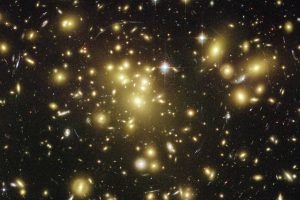Search
Review of the book The end of everything (astrophysically speaking), by the Australian astrophysicist Katie Mack, on the possible ends of the universe.
We see the sky and admire its regularity and stability, its apparent immutability. We have always done so; it does not come as a surprise, since humans have always been startled by any change in the sky, associating it with omens or the mood swings of gods. At that time, they might call these changes «new stars», even if they were, for example, a supernova explosion, as in the case of Tycho’s supernova in the sixteenth century.
In ancient Greece, Empedocles stated that everything was made up of only four elements: water, fire, earth and air. It was undoubtedly the first attempt to describe the content of our universe. Over a hundred years later, Aristotle added a fifth element: ether or quintessence, which formed the stars, while the other four were the constituents of terrestrial substances.



